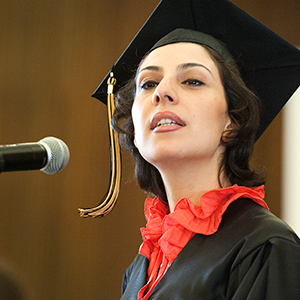 Despite an extraordinary journey from Iran that included a cold winter in eastern Turkey waiting for entry to the U.S., Ghazaleh Vargha arrived at College of Marin with her educational dreams on fire. Behind her were years of religious persecution; ahead had been numerous barriers to a higher education.
Despite an extraordinary journey from Iran that included a cold winter in eastern Turkey waiting for entry to the U.S., Ghazaleh Vargha arrived at College of Marin with her educational dreams on fire. Behind her were years of religious persecution; ahead had been numerous barriers to a higher education.
When she speaks to the graduating class of her peers on May 29, there will be no small words of gratitude.
“In Iran, I probably would be a housekeeper, taking care of a husband and children,” she says. “I think I would do nothing and that wasn’t what I wanted to do. That wasn’t a situation I wanted to think about.”
What she wanted, and has steadfastly pursued since arriving in Marin at the age of 30, was to study biology, become a dentist and open a clinic to provide indigent services. “I want to be useful to my society and help people the same way people here have helped me – not just for my own family. I want to be kind to all children and all families.”
Whether it was learning English, becoming an integral member of a year-long intensive organic chemistry program or tutoring new nursing students in biology, Vargha has steadfastly pursued every opportunity to learn since her first day on the Marin campus in 2007.
“I don’t think determination is a strong enough word to demonstrate what she went through and the kind of sacrifices she made to have this opportunity,” says Becky Reetz, Tutoring and Learning Center coordinator. “Within three years, she has not only mastered a new language, she's also achieved another college degree in another language with a very high GPA. She’s a real testament to what commitment to your dreams and becoming educated is really all about.”
In Iran, opportunities for women are limited, Vargha says. “In my country, if you are a young woman and alone, it’s really difficult to participate in society or do anything,” Vargha says. As a member of the Baha’i faith, she faced even more challenges than most other women. “I was waiting for some kind of chance.”
After marrying, Vargha and her husband decided to leave Iran. The couple spent a long winter in eastern Turkey waiting for passage to the U.S. in a small village with other immigrants. They tried to learn as much English as they could but there was no teacher. She finally traveled to Chicago and then to Marin, where Vargha’s mother and younger sister were already living. Immediately, she signed up for English as a Second Language classes and, after just one semester, began her scientific training as well.
“She was brilliant,” recalls organic chemistry instructor Patrick Kelly who serves as chair of the Physical Sciences Department. “You can teach to the highest level and she’ll come up to that. When I see someone like her, the journey she’s taken, it’s hard to wrap my brain around what it really entails. There was an intensity about her focus in class," he said.
Vargha says it was an urgency to learn and make up for time spent waiting to begin her studies. “I didn’t know many words. My grammar wasn’t good at all. But, I didn’t have more time to be wasted. I was pushing myself to get to the harder classes, be done with college and go after my dreams. I felt there was no more time.” As she learned English, she learned the language of biology as well. “My love for the subject continued to grow,” she says. The following year, as a full-time student, Vargha began to tutor other students in math and science and gained a legion of grateful students.
There were cultural differences, of course, but what surprised her most was the simple acceptance afforded her by strangers. “I was surprised that these people didn’t care which ethnicity, which country, which language, what belief or which god I am praying to,” she says. “They just accepted me as a human being and help me in any way they could. This is what humanity means, I guess. I could see it here and I felt it and I really appreciate it.”
Vargha hopes this starting point will one day be a destination as well. She completed her associate degree with a 3.99 grade point average and is heading to UC-Los Angeles to pursue a degree in biology. She plans to earn a post-graduate degree in dentistry and envisions building a dental practice in which services are provided free to College of Marin students who would not otherwise be able to afford them.
“This is the first place that I found myself,” Vargha says. “I found the qualities I have. I found peace. It gave me the opportunity to go forward and go after my dreams. At least here I am not afraid that this is my belief. I feel freedom as a bird.”
